Renault Clio: K9K, and 750 or 752 or 766 or 768
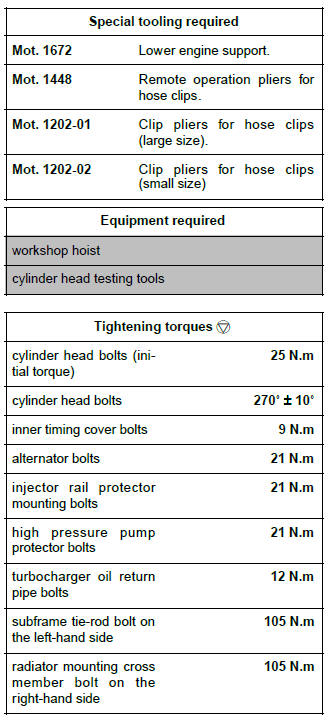
REMOVAL
I - REMOVAL PREPARATION OPERATION
- Position the vehicle on a two-post lift (see Vehicle: Towing and lifting) (02A, Lifting equipment).
- Remove:
- the engine undertray,
- the radiator mounting cross member bolt on the right-hand side,
- the sub-frame tie-rod bolt on the left-hand side.
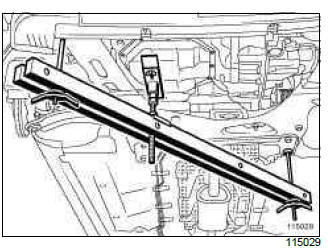
- Fit the lower engine support tool (Mot. 1672).
- Remove:
- the air filter unit air inlet pipe,
- the battery (see Battery: Removal - Refitting) (80A, Battery),
- the battery tray (see Battery tray: Removal - Refitting) (80A, Battery),
- the air filter unit (see 12A, Fuel mixture, Air filter unit: Removal - Refitting, 12A-17),
- the scuttle panel grille (see Scuttle panel grille: Removal - Refitting) (56A, Exterior equipment).
- Drain the cooling system (see 19A, Cooling, Cooling system: Draining - Refilling, 19A-16).
- Remove the catalytic converter (see 19B, Exhaust, Catalytic converter: Removal - Refitting, 19B-29).
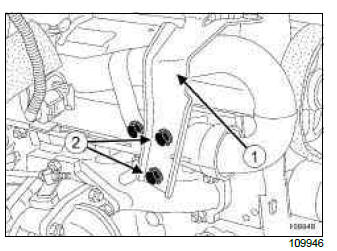
- Refit:
- the timing end lifting eye (1),
- the timing end lifting eye bolts (2).
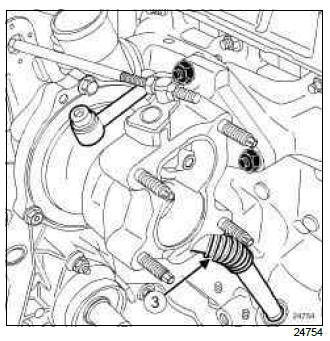
- Remove:
- the turbocharger oil return pipe bolts
- the turbocharger oil return pipe (3),
- the accessories belt (see 11A, Top and front of engine, Accessories belt: Removal - Refitting, 11A-5),
- the timing belt (see 11A, Top and front of engine, Timing belt: Removal - Refitting, 11A-48),
- the rocker cover (see 11A, Top and front of engine, Rocker cover: Removal - Refitting, 11A-183).
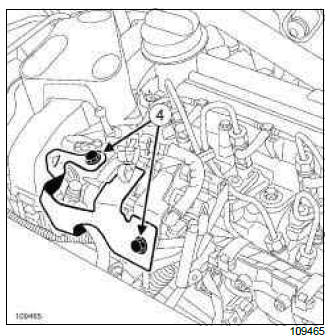
- Remove:
- the bolts (4) from the high pressure pump protector,
- the high pressure pump protector.
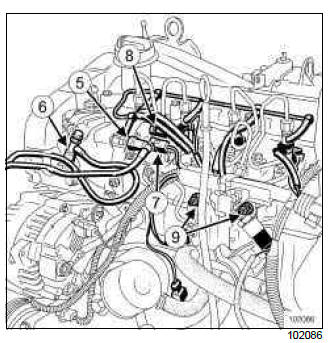
- Disconnect:
- the fuel supply pipe (5),
- the fuel return pipe (6),
- the fuel flow actuator connector (7),
- the diesel temperature sensor connector (8),
- the injector connectors,
- the heater plug connectors.
- Remove the injector rail protector mounting bolts (9).
- Move aside the injector rail protector mounting.
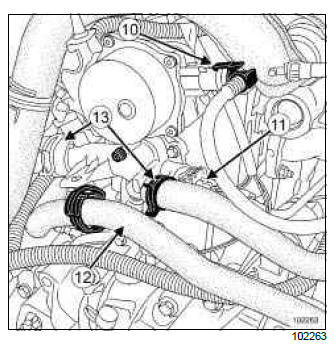
- Disconnect:
- the brake servo pipe union (10) from the vacuum pump,
- the temperature sensor connector (11) on the water chamber.
- Unclip the cooling hose (12).
- Separate the water chamber inlet and outlet hose clip (13) using the tool (Mot. 1448) or (Mot. 1202-01) or (Mot. 1202-02).
- Disconnect the water chamber inlet and outlet hoses.
- Disconnect the crankshaft position sensor connector.
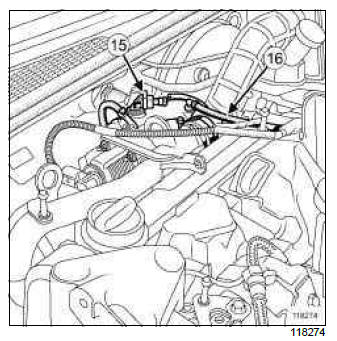
- Disconnect:
- the air temperature sensor connector (15),
- the vacuum pipe (16) between the pressure sensor and the turbocharger air outlet pipe.
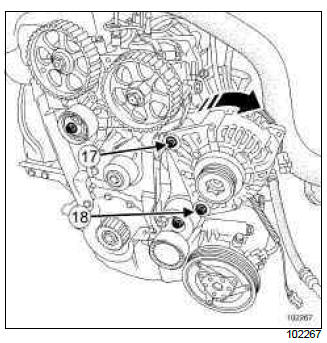
- Disconnect the alternator connector.
- Remove the alternator electrical wiring nut.
- Move aside the alternator electrical wiring.
- Remove the alternator upper bolt (17).
- Loosen the alternator lower bolt (18).
- Tilt the alternator forward.

- Remove:
- the inner timing cover bolts (19),
- the inner timing cover.
II - OPERATION FOR REMOVAL OF PART CONCERNED
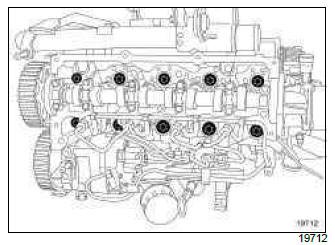
- Remove the cylinder head bolts.
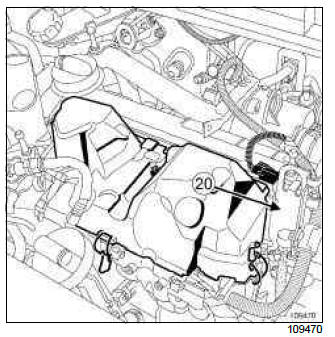
- Refit:
- the lifting eye (20) on the gearbox side,
- the gearbox side lifting eye bolts.
- Fit workshop hoist.
- Remove the cylinder head.
REFITTING
I - REFITTING PREPARATION OPERATION
- parts always to be replaced: Cylinder head gasket.
- parts always to be replaced: cylinder head bolts.
- parts always to be replaced: seal between turbocharger and catalytic converter.
- parts always to be replaced: seal between catalytic converter and exhaust downpipe hose.
IMPORTANT
Wear goggles with side protectors for this operation.
IMPORTANT
Wear gloves during this operation.
WARNING
Do not scrape the joint faces of the aluminium, any damage caused to the joint face will result in a risk of leaks.
- Use a GREY ABRASIVE PAD to clean the joint faces of the cylinder head and cylinder block.
- Use SURFACE CLEANER (see Vehicle: Parts and consumables for the repair) (04B, Consumables - Products) to degrease the joint face of the cylinder head and cylinder block.
WARNING
To ensure proper sealing, the gasket surfaces must be clean, dry and not greasy (avoid any finger marks).
WARNING
Protect the oilway so that foreign bodies do not enter the oil pipes in the cylinder head.
Failure to follow this advice could block the oil supply pipes, causing rapid camshaft damage.
- Check for gasket face deformation using a ruler and a set of shims.
- The maximum deformation is 0.05 mm.
WARNING
No regrinding of the cylinder head is permitted.
- Test the cylinder head to detect any possible cracks using cylinder head testing tools.
- Strip down the cylinder head (see ) (Technical Note 6006A, 10A, Engine and peripherals).
WARNING
In order to ensure that the bolts are correctly tightened, use a syringe to remove any oil which may be in the cylinder head mounting holes.
- Fit a new cylinder head seal, centred by two dowels.
- Bring the pistons to mid-stroke position to prevent any risk of contact with the valves when tightening the cylinder head.
II - REFITTING OPERATION FOR PART CONCERNED
- Refit the cylinder head.
WARNING
Do not retighten the cylinder head bolts after applying this procedure.
- Remove workshop hoist.
- Remove:
- the gearbox side lifting eye bolts,
- the gearbox side lifting eye.
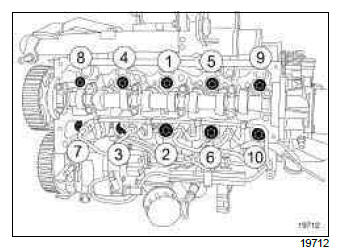
- Refit new cylinder head bolts.
- Pretighten to torque and in order the cylinder head bolts (initial torque) (25 N.m).
- Check that all of the cylinder head bolts are tightened to the correct torque.
- Angle tighten in order the cylinder head bolts (270

